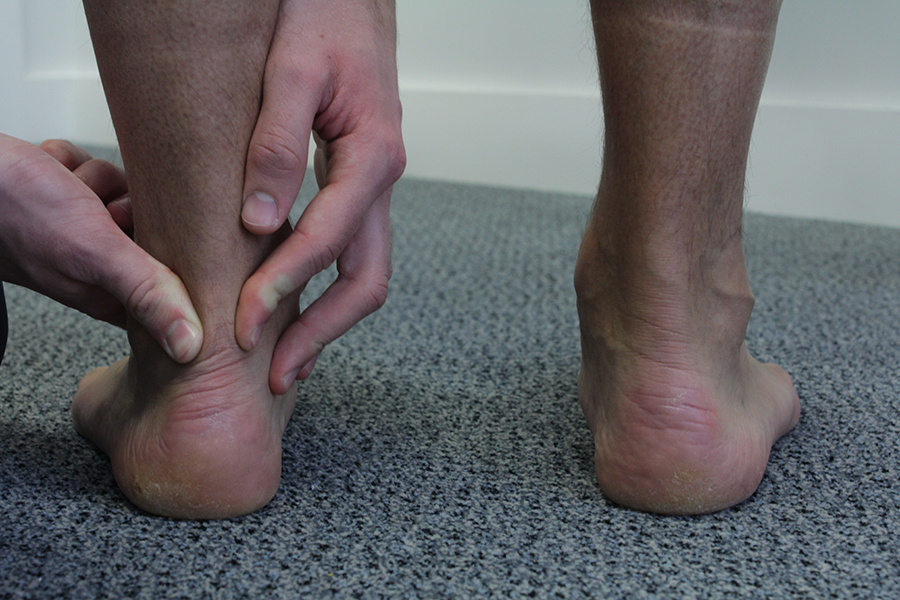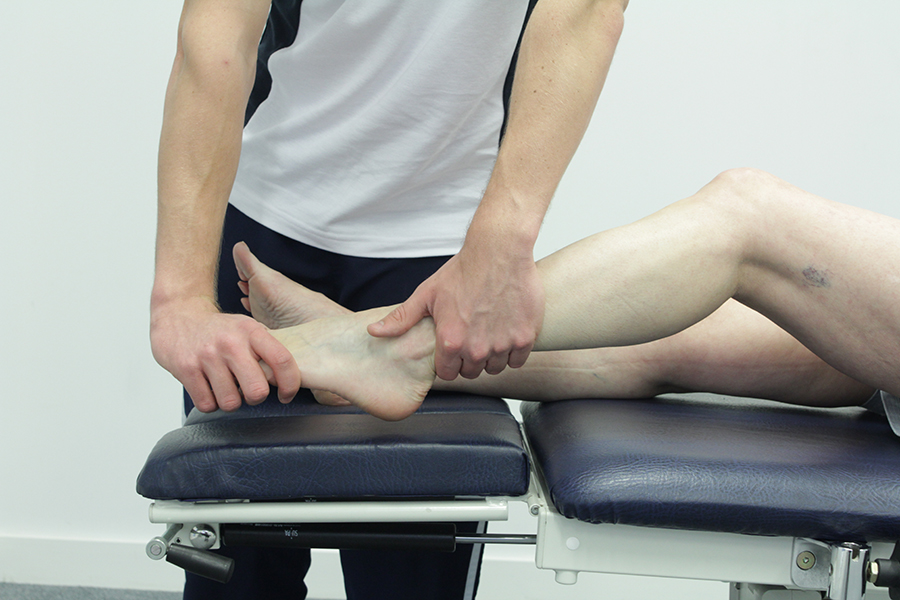Achilles tendonitis
Achilles tendonitis is inflammation of the Achilles tendon. Achilles tendonitis produces pain at the back of the heel and ankle; it is a common sporting injury.
Achilles tendonitis occurs when the Achilles tendon becomes irritated and inflamed. Tendons are strong fibrous bands of tissue that connect muscle to bone, the Achilles tendon connects the heel bone to the calf muscles at the back of the leg; it is the strongest tendon in the body.
Achilles tendonitis occurs when the tendon has been subjected to either repetitive or excessive stress. Achilles tendonitis is most often observed in athletes and those who participate in sports, it is therefore referred to as a sporting or overuse injury. The main underlying cause of Achilles tendonitis is over-pronation. Over-pronation describes a movement of the foot whereby the arch collapses, giving the foot a 'rolled in' and flattened appearance. When the foot rolls in it places a lot of stress onto the Achilles tendon.
Other causes of Achilles tendonitis include: What are the signs and symptoms of Achilles tendonitis?
What are the signs and symptoms of Achilles tendonitis?
The signs and symptoms of Achilles tendonitis include:
One of our podiatrists here at Chiropody.co.uk will be able to diagnose Achilles tendonitis based on:
Treatment with us at Chiropody.co.uk will benefit you if you have Achilles tendonitis by:

Podiatry for Achilles tendonitis would begin firstly with a thorough history taking, which along with the signs and symptoms, and an examination of the Achilles tendon, will lead the podiatrist to a diagnosis. If Achilles tendonitis is confirmed, treatment will aim to reduce any pain and inflammation, as well as to reduce excessive stress on the Achilles tendon. The following treatment options may be recommended for Achilles tendonitis:
Achilles tendonitis refers to inflammation of the Achilles tendon. Achilles tendonitis appears as pain and swelling at the back of the heel and ankle, it is a common condition amongst athletes and sports people. The most common underlying cause of Achilles tendonitis is over-pronation, which causes the arch to collapse and the foot to role in. Over-pronation can place a lot of stress on the Achilles tendon.
It is important to visit a podiatrist if you have Achilles tendonitis. At Chiropody.co.uk our podiatrists are experts in the foot and lower limb,they will devise a treatment plan specific to you. The treatment for Achilles tendonitis will aim to reduce any pain and inflammation, as well as to reduce the forces being placed on the Achilles tendon.
It is important not to delay treatment, if Achilles tendonitis is ignored the risk of developing tendonosis (breakdown/degeneration of the tendon) or rupture is increased.
To arrange an assessment with one our podiatrists please email office@chiropody.co.uk or call 0330 088 4222.
What is Achilles tendonitis?
Achilles tendonitis occurs when the Achilles tendon becomes irritated and inflamed. Tendons are strong fibrous bands of tissue that connect muscle to bone, the Achilles tendon connects the heel bone to the calf muscles at the back of the leg; it is the strongest tendon in the body.
What causes Achilles tendonitis?
Achilles tendonitis occurs when the tendon has been subjected to either repetitive or excessive stress. Achilles tendonitis is most often observed in athletes and those who participate in sports, it is therefore referred to as a sporting or overuse injury. The main underlying cause of Achilles tendonitis is over-pronation. Over-pronation describes a movement of the foot whereby the arch collapses, giving the foot a 'rolled in' and flattened appearance. When the foot rolls in it places a lot of stress onto the Achilles tendon.
Other causes of Achilles tendonitis include:
- Wearing high heeled shoes
- Being overweight
- Not stretching and warming up appropriately
- Overuse
- Incorrect footwear
- Tight calf muscles
 What are the signs and symptoms of Achilles tendonitis?
What are the signs and symptoms of Achilles tendonitis?
The signs and symptoms of Achilles tendonitis include:
- Pain at the back of the heel, approximately 2 ' 4cm above the tendons attachment at the heel
- Pain and stiffness in the Achilles tendon that comes on gradually and gets worse. The pain is typically worse in the morning (upon getting out of bed) and after periods of activity
- Swelling at the back of the heel at the site of the Achilles
- Cracking and creaking of the Achilles tendon
How is Achilles tendonitis diagnosed?
One of our podiatrists here at Chiropody.co.uk will be able to diagnose Achilles tendonitis based on:
- A history
- Signs and symptoms
- Examination and palpation of the Achilles tendon
Benefits of Podiatry for Achilles tendonitis
Treatment with us at Chiropody.co.uk will benefit you if you have Achilles tendonitis by:
- Reducing pain and inflammation
- Improving gait
- Preventing future injury
- Offloading the Achilles
- Reducing tightness in the calf muscles
- Improving the mechanics of your leg and foot

What would podiatry for Achilles tendonitis involve?
Podiatry for Achilles tendonitis would begin firstly with a thorough history taking, which along with the signs and symptoms, and an examination of the Achilles tendon, will lead the podiatrist to a diagnosis. If Achilles tendonitis is confirmed, treatment will aim to reduce any pain and inflammation, as well as to reduce excessive stress on the Achilles tendon. The following treatment options may be recommended for Achilles tendonitis:
- Orthoses
- Stretching Programmes
- Ultrasound
- Rest
- Anti-inflammatory advice
- Soft tissue treatment
- Acupressure
- Manipulation / mobilisation
- Massage
- Myofascial release
- Soft tissue mobilisation
- Trigger point therapy
Summary
Achilles tendonitis refers to inflammation of the Achilles tendon. Achilles tendonitis appears as pain and swelling at the back of the heel and ankle, it is a common condition amongst athletes and sports people. The most common underlying cause of Achilles tendonitis is over-pronation, which causes the arch to collapse and the foot to role in. Over-pronation can place a lot of stress on the Achilles tendon.
It is important to visit a podiatrist if you have Achilles tendonitis. At Chiropody.co.uk our podiatrists are experts in the foot and lower limb,they will devise a treatment plan specific to you. The treatment for Achilles tendonitis will aim to reduce any pain and inflammation, as well as to reduce the forces being placed on the Achilles tendon.
It is important not to delay treatment, if Achilles tendonitis is ignored the risk of developing tendonosis (breakdown/degeneration of the tendon) or rupture is increased.
To arrange an assessment with one our podiatrists please email office@chiropody.co.uk or call 0330 088 4222.
Save 5% by booking an appointment online.

Find your nearest clinic
We have clinics located throughout the North West. We also provide a home visit service.
Find out more »

No waiting lists!
Tired of waiting for treatment? Be seen by a podiatrist today!
Find out more »

Not sure how we can help?
Speak to a podiatrist to find out how we can help. Call us on 0330 088 4222.
Find out more »
We work with:

Individuals

Organisations

Health professionals
Get in Touch!
0330 088 4222
If you would like to speak to one of our specialists then please complete this form.
We are open 7 days a week








